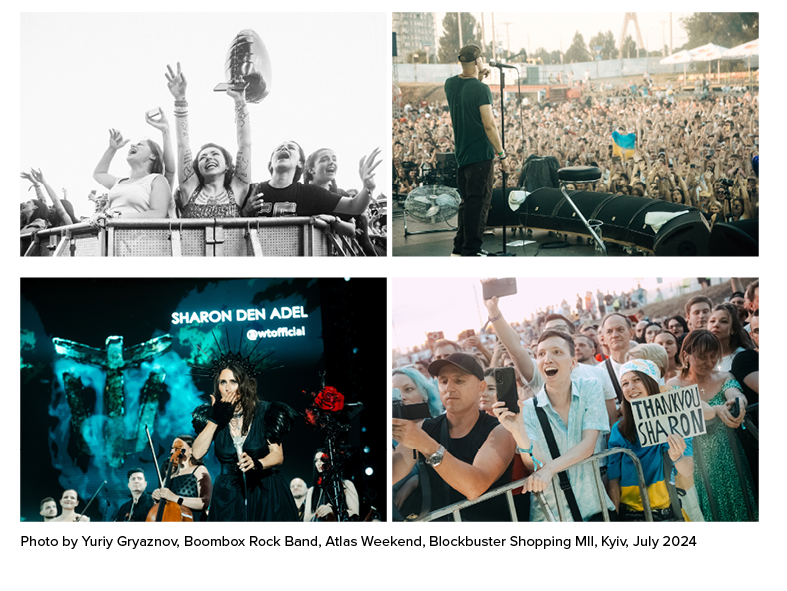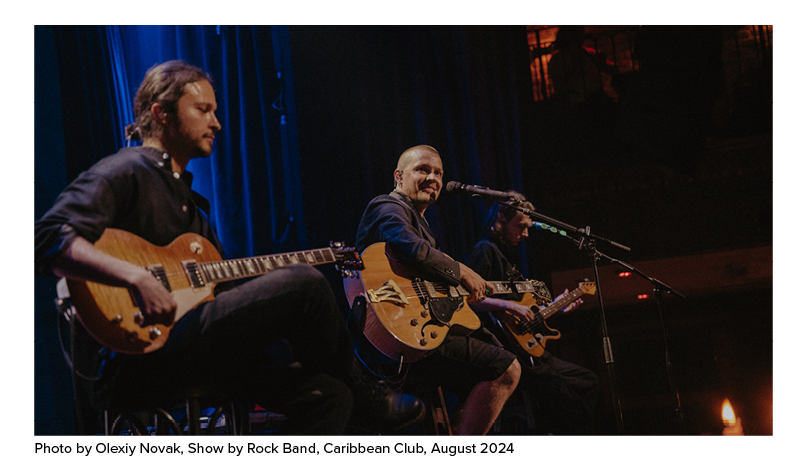Coping with War in Kyiv: The Power of Live Music for Survival

Kyiv, Ukraine’s capital and largest city, has become a symbol of resilience amidst the ongoing war with Russia. Despite relentless bombings and attacks, the city’s vibrant entertainment and cultural scene has transformed from a source of mere leisure into an essential pillar for mental survival. Theatres, concert venues, and festivals have become sanctuaries for residents, offering solace, unity, and emotional relief in the face of extreme adversity. This article shows how live music in Kyiv has become essential for mental well-being during the war. Through the voices of organisers, musicians, and attendees, the piece highlights how live music has come to provide a powerful escape in the face of war.
Anastasiya Vaganova, Lecturer Breda University of Applied Sciences, vaganova.a@buas.nl
The New Role of Concerts in Wartime Kyiv
Before the Russian invasion, Kyiv was well known for its cultural vibrancy. It boasted the highest number of theatres and concert venues in Ukraine and played host to international superstars like Imagine Dragons, Madonna, and Depeche Mode. The Atlas Weekend Festival, one of the largest music festivals in Eastern Europe, that took place in 2021 reinforced Kyiv’s status as a global music hub.
Since the war, Kyiv’s cultural scene has adapted rapidly. Despite the constant threat of missile attacks, musicians in Kyiv remain determined to perform. For many, the war has shifted the purpose of their craft, turning performances into a form of duty. The ongoing conflict has forced event organisers to make significant adjustments though. ‘’There are many events happening all over Ukraine every week, including festivals, mainly in the safer areas of the country, which are not close to the frontline. In September 2023, we finally reopened our Atlas venue (from which the festival got its name) in Kyiv and concerts have been happening there since. Other venues have been operating even earlier. The organisers had to adapt a lot for that to become possible. You must deal with the curfew, which starts at midnight. This means that most events are over by 10 PM so people can reach their homes on time. We have been dealing with blackouts as well, meaning most venues had to get a generator and learn to switch to it as soon as the lights went down to continue the event. And, of course, each venue needs to have a shelter nearby and a robust evacuation plan. As soon as the siren starts, the event has to stop, and people needs to shelter .There are now some venues that are based in a shelter, especially in the frontline cities, where it is the only opportunity to make a relatively safe event, as often, there is not enough time for evacuation because the missiles reach the cities too quickly.’’( Vlad Yaremchuk, Music Save Ua, booking agent Atlas Weekend, Atlas Venue.)
Events now need to be carefully planned around curfews, missile strikes, and the availability of nearby shelters. Organisers provide shelters next to venues for visitor safety during missile threats. Also, due to curfews, showtimes have been moved earlier. Atlas Weekend, for instance, had to relocate from its traditional venue at the National Expo Center to Blockbuster Mall, which offers a 50,000 m² underground parking lot serving as Ukraine’s largest bomb shelter.
"During our preparations, we had to deal with lengthy blackouts due to ongoing Russian attacks on electricity infrastructure. Sometimes, we would have only 4 hours of electricity spread across the working day, making the process even more difficult than it already was.’’
Also staffing the event was a challenge.
"We only had a few months to organise the whole festival, which also made things difficult. Usually, we would need a year, if not more, to organise everything, but this time, we only had a few months and had to gather a team. It’s been 3 years since our last festival. A lot of people changed jobs, some left Ukraine, some were part of the military and so we needed to get a lot of new people in, who we had to integrate into our processes on the go.’’ ( Vlad Yaremchuk, Music Save Ua, booking agent Atlas Weekend, Atlas Venue.)

Dmitriy Felixov, director of Concert.UA, Ukraine’s largest ticketing service, reflects on how these logistical hurdles have affected the industry: "The war has revealed hidden national potential. Additionally, there is a strong demand for Ukrainian theatre which is flourishing. Holding events is important for maintaining mental health. People mostly see attending concerts as a therapy session.”
Music events for charity
Many events have started to incorporate charity functions, allowing attendees to donate to the country. Such was also the case with the Atlas Weekend festival in summer 2024. The festival featured over 50 acts and attracted 60,000 attendees. Though fraught with logistical challenges such as missile threats and curfews, the festival was still able to raise over 2.3 million EUR to support Ukrainian communities affected by the war.
The Caribbean Club, one of Kyiv’s most iconic venues, has hosted over 3,000 performances since its transformation into a concert hall in 2013. Even during the war, it continues to organise charity events, raising funds for humanitarian causes. Since the reopening of the Caribbean Club Concert Hall in May 2022, venues across Kyiv have hosted over 400 shows, selling 60,000 tickets and raising over than 150,000 euros for charity.
Dennis Adu, a renowned Ukrainian jazz musician, trumpeter, and conductor, has become a symbol of cultural resistance since the start of the war in Ukraine. In addition to his work as a lecturer and band leader, he quickly defined his civic role in response to the Russian invasion. Alongside other artists, he joined the *Ukrainian Art Front (UAF)*, a collective founded in Lviv in March 2022 to raise funds for the Armed Forces and aid civilians. Through his actions and performances, Dennis Adu transformed his music into a vital tool for resilience and resistance. Dennis Ady and the Ukrainian Art Front (UAF) project further illustrate how music can unite people, raising funds and morale. The unity and humanity witnessed in the early days of the war continue to resonate through these musical endeavours, proving that even in the darkest times, art and community can light the way forward.
Music for mental health
In a city under siege, where air raid sirens are an everyday occurrence, music and other forms of entertainment have become ways to cope with the stress and trauma of war. These events provide a temporary escape from the brutal reality, fostering a sense of community and normalcy. Dmitrii Vasiliev, regular visitor of the Kyiv music concert venue Peppers Club, captures this feeling perfectly:"Live music creates a space of shared experience, creativity, great mood, and optimism—everything you need to cope with stress.”
Jazz musician Dennis Adu, lecturer at the R.M. Glier Kyiv Municipal Academy of Music, shared how playing music has helped students cope with the psychological burden of the conflict: ‘’In July, the admission campaign took place at the R. M. Glier Kyiv Municipal Academy of Music, and in September, we started mixed learning. Everyone understood that it was also necessary to encourage students to work and thus pull them out of the difficult moral state they found themselves in during the hostilities in their cities. Finally, "offline classes” began to be held, as it was very difficult to study online during the first months of the war, and most students did not always could do so. It was felt how everyone missed playing music together, even when conducting orchestra classes with 5-6 people, everyone was very happy to be there, play together, and learn something new. The eyes of most students changed at that moment when they entered the rehearsal rooms, and I, along with them, forgot about the horrors happening in the country for 2.5 – 3 hours, and only the "air raid alert” brought us back to reality. Everyone began to adapt to the conditions in which they had to live. And musicians were no exception.’’ (Jazz musician, lecturer Dennis Adu)
Organising music events serves as a crucial coping mechanism for musicians and promoters. It allows them to channel their stress and anxiety into something positive and impactful. The sense of purpose and community they derive from their work is invaluable, as highlighted by Yaremchuk’s gratitude for the support from both within and outside Ukraine. This support not only sustains their efforts but also fosters a profound sense of unity and shared purpose.

Kyiv’s concert venues, more than just places for entertainment, have become vital lifelines for the city’s residents. These events offer much-needed joy and respite from the relentless war. As a regular visitor to the music venues Caribbean Club and Pepper’s club Dimitrii Vasiliev notes, that live performances create shared experiences and provide a much-needed escape from daily hardships. For many, attending concerts has become a crucial way to maintain mental health and a sense of unity.
Cultural Diplomacy: Global Support Through Music
Finally, music has emerged as a powerful unifying force. Concerts and festivals, both local and international act as platforms for solidarity and cultural diplomacy. Vlad Yaremchuk (director of Music Saves UA and booking agent for festival Atlas Weekend), recounts a significant event during the summer of 2024:
"On July 8th, Monday, the same week the festival was supposed to start, Russia did one of the most brutal missile and drone attacks on Kyiv yet. We had to switch to a primarily local line-up since not many international artists were ready to play in Ukraine during the war. We managed to get an international headliner - Sharon den Adel from (Dutch well-known rock band) "Within Temptation’’. She came to Ukraine earlier that year to shoot a music video and was ready to come again to perform.”
Music Saves UA, a humanitarian fundraising initiative, has become a beacon of cultural diplomacy for Ukraine. Spearheaded by the Ukrainian Association of Music Events, it collaborates with international festivals, conferences, and artists to raise both awareness and funds. Since its start on March 1, 2022, the initiative has raised over 630,000 euros, providing urgent humanitarian aid and rebuilding cultural infrastructure.
International artists play a pivotal role in supporting Ukraine’s cause. By performing at Ukrainian festivals, they foster global solidarity, acting as cultural ambassadors. Through Dutch festivals like Lowlands and Pinkpop, Music Saves UA raises funds while showcasing Ukrainian talent on the global stage.
The impact of these collaborations extends beyond financial aid. As Yaremchuk emphasises, personal interactions between Ukrainian artists and international audiences have opened eyes to the realities of life in Ukraine. Many people are surprised to learn that despite the war, Ukrainians continue to live, create, and maintain their cultural identity.
The Unbreakable Spirit of Kiev’s Cultural Scene
During constant conflict, Kyiv’s cultural and entertainment spaces have thus become much more than just places to have fun—they have turned into safe havens where people find comfort, togetherness, and strength. The way the city’s artists, event organisers, and audiences turn moments of joy into essential support for mental and emotional health, and humanitarian aid, shows the unbreakable spirit of Ukraine. Art and music’s ability to heal, bring people together, raise awareness and inspire hope has never been clearer than in Kyiv. These performances are crucial for the nation’s survival. As the war continues, Kyiv’s live music scene remains a symbol of hope and strength. It serves as a reminder that even in the toughest times, people find ways not just to survive but also to live and thrive for a better, peaceful future. Live music shows, in particular, acts as a powerful tool that can unite everyone in need and spread this enduring hope.



































































